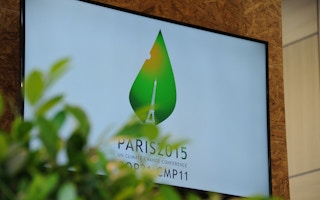Nowadays, people are too often forced to choose between doing what is morally right and doing what is economically beneficial. Indeed, their options sometimes appear to be mutually exclusive, making the decision of which path to take exceedingly challenging. Sometimes, however, moral rectitude and economic interest merge, presenting an opportunity that must not be missed. That is the case – from the perspectives of this Archbishop and former finance minister – with the world’s response to climate change.
The moral imperative is indisputable, as the effects of climate change – including extreme weather, temperature changes, and rising sea levels – are felt most keenly by the global poor, who have also benefited the least from the economic activities that cause it. Moreover, climate change could accelerate poverty and inequality in the future, meaning that, unless we address it in a timely manner, it will diminish – or even eliminate – future generations’ chances to achieve their development goals. Making every effort to minimize climate change today is, quite simply, the right thing to do.
Fortunately, the economic benefits of addressing climate change are also clear. After all, climate change carries significant economic costs – for example, those associated with more frequent and extreme weather events. Moreover, building a “green” economy, based on continued technological innovation, is the smartest and most efficient way to create new engines of sustainable growth and job creation for the next generation.
Action at the individual, company, municipal, and national levels is crucial. But the fact is that climate change is a global problem – and thus requires a global solution. The most important tool the world has for doing the right thing – and reaping vast economic benefits – is a universal climate-change agreement. That is why world leaders must take the opportunity presented by the United Nations Climate Change Conference in Paris this December to develop a single global framework for action.
“
But if the Paris meeting is to be successful – in terms of both fulfilling the moral imperative and capturing the economic benefits of confronting climate change – every participating country must submit its national contributions for the period beginning in 2020 as soon as possible.
In fact, world leaders already pledged to do so. The UN Climate Change Conference in 2011 – initiated and hosted by South Africa – produced an agreement to adopt a universal legal agreement on climate change as soon as possible, no later than this year.
Important progress has been made since the Durban conference. Last month, more than 30 countries – including the European Union’s members, Gabon, Mexico, Norway, Russia, Switzerland, and the United States – submitted their post-2020 plans to reduce greenhouse-gas emissions. In the coming weeks and months, this momentum will continue to build, as other countries – including, it is expected, major emerging economies like Brazil, China, and India – submit their commitments as well.
But if the Paris meeting is to be successful – in terms of both fulfilling the moral imperative and capturing the economic benefits of confronting climate change – every participating country must submit its national contributions for the period beginning in 2020 as soon as possible. Furthermore, the final agreement must include an effective and ambitious plan for de-carbonization over the next 50 years.
The fact is that short- and medium-term commitments alone are simply inadequate to fulfill the pledge, made by the world’s governments in 2009 and reiterated in 2010, to cap the rise in global temperatures at 2° Celsius relative to the pre-industrial era. It is crucial to create – and adhere to – a progressive long-term emissions-reduction strategy that sends a clear signal to capital markets that governments are serious about confronting climate change.
Such a strategy could include, for example, incentives for investment in low-carbon solutions. With some $90 trillion dollars set to be invested in infrastructure globally over the next 15 years, the impact of such an approach could be considerable – if not decisive.
The moral and economic imperatives to act on climate change could not be stronger. Although the road ahead will be difficult, with new and unexpected challenges arising along the way, we can find inspiration in Nelson Mandela’s famous dictum: “It always seems impossible until it’s done.” We face an unprecedented opportunity to achieve a more sustainable, prosperous, and socially just future. Creating that future must start now.
Desmond Tutu, a Nobel Peace Prize laureate, is Archbishop Emeritus and former Archbishop of Cape Town. Trevor Manuel was South Africa’s finance minister from 1996 to 2009.
Copyright: Project Syndicate, 2015.
www.project-syndicate.org











